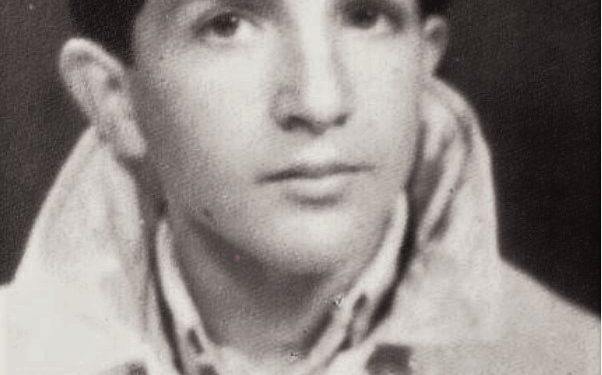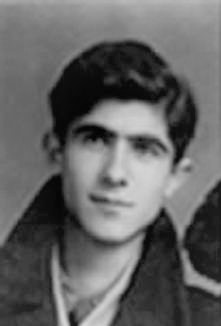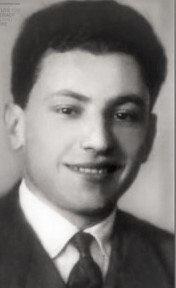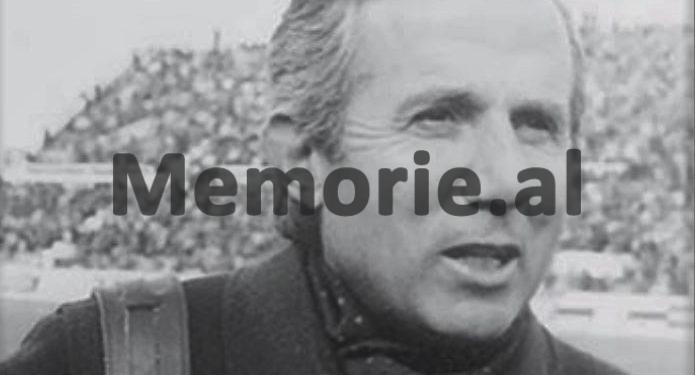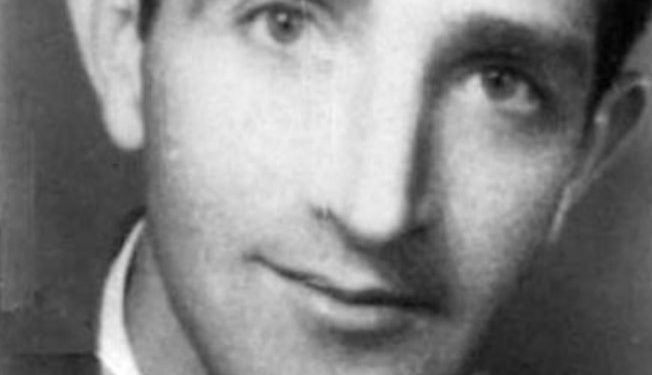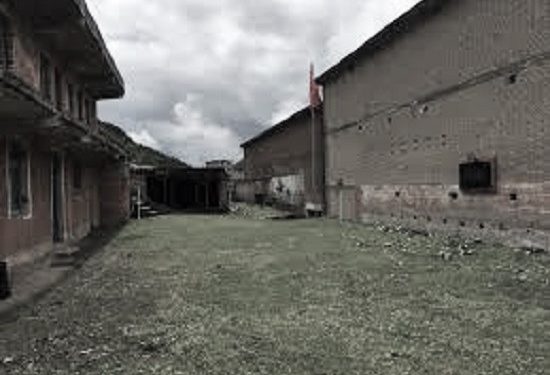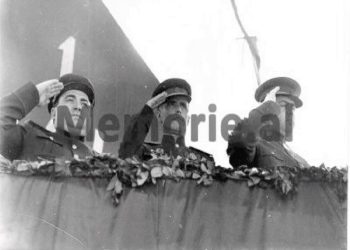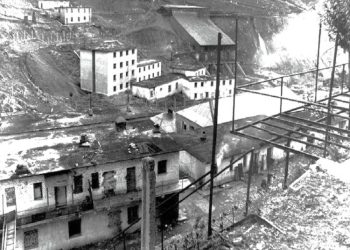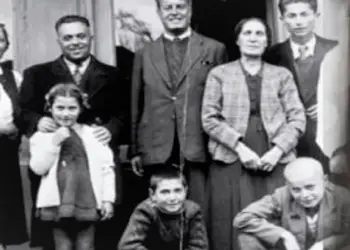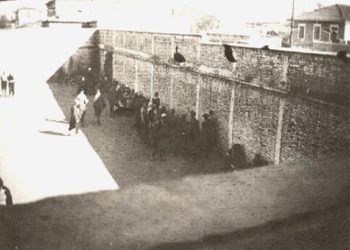From Skifter Kelliçi
The third part
Memorie.al / It was the morning of May 20, 1994, when I entered the office of Skënder Buçpapaj, then General Director of Albanian Radio and Television. And not without purpose. I reminded him that, on May 28, it was 15 years since the shooting of Fadil Kokomani and Vangjel Lezho, two of the best journalists of Radio – Tirana, since its creation, as well as Xhelal Koprencka, another political prisoner, who was shot together with them. I added that, after the fall of the dictatorship, it was the occasion for this anniversary to be commemorated with a special ceremony.
Continues from last issue
Then other friends of Fadili and Vangjeli were arrested, the military poet, Trifon Xhagjika, the journalist Robert Vullkani, the painter and singer Stavri Rafael, together with his brother, Thomain Rafael, also the military man like Trifon e, other friends of to the group that wanted to escape, who were then subjected to a lengthy investigative process that lasted four months.
TRIAL
It took place in the first days of December 1963. There it became clear that this group had tried to escape from Lake Pogradec, that Sunday July 1963, but had been dictated to. Fadili, who was in the second car, in order to lose his tracks, had continued on his way to Korça and from there, he had just returned to Tirana. This is why he was arrested later than his friend, Vangjeli.
The goal of the group members was to go from Yugoslavia to the Soviet Union. Fadil Kokomani and Vangjel Lezho, as we mentioned above, were familiar with and in love with everything that had happened there, after the 20th Congress of the Communist Party of the Soviet Union, in 1956, which brought a liberal spirit, quite the opposite of that who ruled in Albania during Stalin’s tyrannical rule.
Accustomed to this spirit, they, on returning to their homeland, found a completely opposite, gloomy atmosphere, in which no one dared, even jokingly, to make any criticism of the situation, at a time when, in In the Soviet Union, the leaders, including Khrushchev, were openly shown jokes, even on the train, bus or elsewhere. If we add here the fact that they, especially Vangjeli, had a wife and child in Moscow, their desire to go to the Soviet Union is clearly understood.
Before the breakdown of relations between the two countries, it was quite normal to hang out with employees of the Soviet embassy. I was even associated with Viktor Nerubaillon, an employee of this embassy, whom I met again in 1991, when he was appointed the first ambassador of Russia in our country.
And this is because his wife, Galina, had been a student in a course with me, at the History-Philology faculty of the University of Tirana (1955-’59) and I had helped her in difficult subjects, such as; the historical grammar of the Albanian language. In fact, I had not only gone with them to the Soviet Club, but I had also visited their home.
It is understood that the relations of Fadili and even more of Vangjeli and his wife, Ina, with other employees of the Soviet embassy, were even closer, especially with an employee named Valentin, who also spoke Albanian.
After the meeting in Bucharest, in June 1960, when it was seen that Soviet-Albanian relations were at a standstill, during the meetings with Valentin, Vangjeli, as it was said then, handed him letters criticizing the steps taken by Enver Hoxha, to break away from the Soviet Union. However, what was expected happened: the relations between the two countries broke down and a good part of the Soviet women, as we have seen, left Albania. Among them is Ina, Vangjeli’s wife.
Here, then, is another impulse of the two friends, to escape to the Soviet Union, where Fadili happened to go on vacation in September 1960. He spoke to me then, much more excited by everything he had seen. there for two weeks.
Since 1957, when he had returned to his homeland, after finishing his studies in Leningrad, he had noticed obvious changes. People were more redeemed, freer. Even the standard of living, especially compared to our country, had started to change. Above all, there were frequent arrivals of foreign delegations from all areas, a phenomenon that proved that the Soviet Union, despite the differences in the ideological field, was increasingly looking for rapprochement, especially with Western countries.
Regarding the above letters, the well-known publicist, Fatos Lubonja, who, as we will see below, will be the protagonist of this cycle, in the testimonies he brings in his book “Rebirth”, with great artistic value published in 1997, states: “The text of their letters was posted on the stands of the 22nd Congress of the Communist Party of the Soviet Union that was held in Moscow in 1962. On them was written: “Here’s what the real Albanian communists say”. Enver Hoxha and the others were completely furious and ordered to find the authors of the letters as soon as possible” (“Ridënimi”, page 148).
During the judicial process, the activity of this group was revealed, supported even by the tract we mentioned above, which demanded the overthrow of the Stalinist regime of Enver Hoxha, which was held with unparalleled violence.
Based on the accusation, for high treason in the form of espionage, because of the letters sent through the Soviet embassy, the tracts that made public calls for insurrection, for terrorism, because they had also thought about a possible assassination attempt against Enver Hoxha, as well as for treason against the homeland with the attempt to escape, the prosecutor requested the death penalty for Fadil Kokomani, Vangjel Lezho and Trifon Xhagjika and Thoma Rafaeli, who were soldiers.
In the decision of the court, on December 6, 1963, the sentence of Vangjeli and Fadil was reduced to 25 years of imprisonment, while the death penalty remained in force for the two soldiers.
I remember that on that wet morning, when the above decision was given, I was waiting with a heavy heart at the foot of the Court building, which was located on “Durrës Street”, not far from the Radio building, for the convicts to come out from there, the trial of who had shocked Tirana.
I wanted to see Fadil and Vangjeli for the last time. A little further on, I caught the eye of Dr. Llukan Xhagjiken, a well-known cardiologist, who also studied in the Soviet Union. Apparently, he was on the sidewalk in front of the Court, waiting for the release of the prisoners, among whom was his brother, Trifon.
Seeing him in handcuffs, he shouted with all the strength of his voice, which he used tremblingly: “Hold Tryphon, hold!”! The policemen immediately turned their heads towards the doctor and, in the blink of an eye, pushed him roughly. (Then he was exiled for years, in remote places in the North). Then my gaze slipped and stopped on my two friends, Fadili and Vangjeli. How livid, how weakened he was in those four exhausting months spent in the dungeons of the investigation…!
I followed them with my eyes to the back door of the car-jail, hoping that our eyes would cross, but in vain. And that was the last time I saw them alive…!
Afterwards, we found out that both Fadili and Vangjeli were serving their sentences in the “re-education” camp, or rather the concentration camp, in Laçi. Even there, from time to time, they also played the role of translators of Chinese specialists, who directed the works for setting up some factories.
Then I had no information about them. The truth was that I could have known more, because one of Fadili’s sisters worked in one of the study halls of the National Library of Tirana and I knew her well, even before Fadil’s arrest. But when I asked him once, I noticed that he was reluctant to answer me. There was no fault. I had put him in a difficult position.
This was not enough, but less than two years after the arrest and conviction of Fadil and Vangjeli, another equally serious event shocked us unexpectedly. In an attempt to escape to the Albanian-Yugoslav border, somewhere in the Përrenjas area, he was caught together with his brother, another journalist of Radio Tirana, Abdulla Sallaku, who was a political commentator in the newsroom.
I had him as a childhood friend and colleague. Like Fadili, he too had a communist background, but this did not prevent him from taking a critical stance, starting from the clashes that Fadili had with the director-dictator of Radio, Thanas Nano.
Abdullai with his brother, Nuri, and other friends, went through a long investigative process and then the trial, where he had strong arguments with the prosecutor and openly stated that he wanted to escape to the West and work as a journalist there, for proved the dire situation the Albanian people were in. This resulted in his sentence of 18 years of rigorous imprisonment, with this motivation:
“With decision no. 41, dated 10.7.1965 of the District Court of Tirana, is sentenced for the crime of escaping abroad, remaining in the attempt and for agitation and propaganda, with 18 years of imprisonment. By decision no. 12.1.1980 in the District Court of Tirana, for agitation and propaganda against the people’s power, he is also sentenced to 10 years of imprisonment.”
Abdullai also went through several concentration camps, where he met Fadil and Vangjeli, whom he knew well, since they worked at Radio.
Three convicted by Radio-Tirana in less than two years…! And if you add Vehip Demi, which we mentioned above, it is clear how this institution was increasingly targeted by the Central Committee and the Ministry of the Interior. And, indeed, before 10 years had passed, the events of the 11th Song Festival at RTVSH would break out, which would lead to the arrest of two others, again by RTVSH, of the General Director, Todi Lubonja, and the artistic leader, Mihal Luarasi, and then the journalist Gramoz Mborja.
But let’s go back to the events related to the further fate of the two protagonists of our story…!
Letter of Fadil and Vangjeli from the prison camp, against Enver Hoxha
From the day of the sentence until the beginning of 1979, when their terrible ordeal would begin, Fadil Kokomani and Vangjel Lezho spent a miserable life in the prison camps of Fushë-Kruja, Elbasan, Skravotina, Spaçi, in the prison infamous Burrell, then in the Tepelena concentration camp and finally again in Spač.
It is understood that living for such a long period in prisons and concentration camps, when you do not know if you will ever get out of them alive, is a deadly pressure. Such was this period of hell for both friends. However, they did not agree on this condition.
In very difficult conditions, just as the well-known writer Pjetër Arbnori acted, who secretly wrote works, which he was secretly taking out of prison (to be published only after the fall of the communist dictatorship), so they engaged in creativity artistic. First, they translated the works of the great giants of Russian and world literature, from Chekhov to Schiller, as well as original works, stories and novels such as “Love and Hate”, “Bells of the Desert” and others.
Unfortunately, just as all Fadili and Vangjeli’s shows disappeared from Radio-Tirana’s audio library, so did the above works by the people of Sigurimi.
Following the press, seeing that day by day, Enver Hoxha was continuing with blind persistence, a path that was separating Albania, more and more from the world, in the summer of 1978 they decided from Spaçi, where they would serve the sentence, to write a letter to Hysni Kapo and Ramiz Ali, close collaborators of dictator Hoxha. It was a very brave letter that, until then, no prisoner had dared to send, let alone write to a leader like Enver Hoxha, even more so to him, who was considered the God of Albania.
Maybe they apologized to them?! Not at all. In this letter, they suggested to the bureaucrats in question, to take measures to stop Enver Hoxha, who was leading the country to complete disaster, and accused him of crimes against the Albanian people, which were no different from Stalin’s monstrous crimes. .
Years ago, I had the chance to meet Robert Vulkani, co-sufferer with Fadil and Vangjeli, who told me about this unparalleled act of his friends. He had then advised the two of them not to take such an action that would lead to a bullet. But both Fadili and Vangjeli were steadfast.
In his book “Reconviction” that we quoted above, Fatos Lubonja writes: “An investigator who was later convicted and went to prison, said regarding this story that the letter was returned to the Ministry of the Interior, with the note of Hysni Kapo: “To be sentenced to death”! (“Rejuvenation”, 1997, page 66).
At the same time, a more or less similar letter was sent to the Central Committee by the other prisoner, Xelal Koprencka, who had been persecuted by his family for years and convicted for agitation and propaganda.
About Xelal, his relations with Fadil and Vangjeli as well as his letter, I will talk later.
Xelal Koprencka, in front of Vangjel Lezho and Fadil Kokomani!
As testified by those who knew him even before his imprisonment, Xelal Koprencka used to be weak and unhealthy. He came from a persecuted family, since the first years of the establishment of the communist dictatorship in Albania and for years, he had spent his sentence in the camp of Belshi and then was sent to that of Spaçi.
With surprising persistence, he had learned foreign languages to the point where he could even translate. And, since he also had a paralyzed arm, he was tasked with translating materials for the bodies of the Ministry of Internal Affairs, which from time to time, as Robert Vullkani told me, he confessed to other prisoners, full of emotion and drama.
In his book, “Ridënimi”, Fatos Lubonja suggests that Xelal Koprencka sent his letter to the Central Committee, prompted by the letter that Fadili and Vangjeli had previously sent to this address.
What is the truth, such an act was to be envied by the prisoners, but it is understood that no one had the heart to do this, when it was known that this action was unparalleled selflessness? But here is that Xelal, small and slender, followed the example of Fadil and Vangjeli.
So, within a short time, two moving letters were sent towards the “Red Dome”. As for Xhelal’s letter, the only difference was that, if Fadili and Vangjeli insisted in their letter, among others, that Albania should start the democratization process, following the Soviet path, Xhelal suggested that it should continue the path of China, which had established diplomatic relations with the USA.
I consider it reasonable to stop at this point, because even to this day, the discussion remains open as to who of the three – Fadili and Vangjeli, on the one hand, and Xelali, on the other hand, was more right. Even, a good part of those ex-prisoners, who have taken and participate in the discussion of this nature, give more right to Xelal, describing the first two as communists who wanted in their letter, only for our country to join the Soviet Union.
But the problem should not be seen so simply. First, it should be noted that both Fadili and Vangjeli were communists. Even, as Fadili himself told me several times, not only his parents and brothers, but also him, although he was young, had helped the Anti-Fascist Movement, and had even been exiled together with other family members. Even at school he was a youth activist. Then, being an excellent student, he had earned the right to study journalism in the country of the Soviets. This is where his transformation began because the first years of his studies in Leningrad coincided with the post-Stalinist period.
“Then, Fadili told me one day, I saw the difference between Soviet communism and the so-called Enverist communism, which was nothing more than a blind version of communism that Stalin had followed. I understood this well, that day in March 1953, when Enver Hoxha forced the whole people in “Skënderbej” square to kneel as a sign of pain, for the death of Stalin.
This, for me, should not have happened. Why did the honor reach this far, for this dictator that Enver worshiped foolishly?! And when I talked with Soviet comrades, this belief was strengthened even more, because they spoke to me with hatred about Stalin and the new course, which was being followed after the 20th congress of the Communist Party of the Soviet Union, they called it logical.
“In fact, continued Fadili, then the so-called class war was softened significantly, not only leaders convicted by Stalin were rehabilitated, but also many and many of his victims, a large part of whom, after death, and there were thousands and thousands who were released from prison and concentration camps. Such a thing happened only for a short time in our country, there from 1956, and this was because of Khrushchev’s speech at the 20th Congress, and soon, the class war resumed. Even tougher”.
This pushed Fadil and then Vangjeli to hate Enver’s communism even more. Therefore, although they were still studying in the Soviet Union, they painfully followed the tragic events of the Tirana Conference in 1956, where the voice of honest communists, who sought the democratization of party life, in the spirit of the 20th Congress, was drowned out.
In the Soviet Union, as we have seen, Fadili and Vangjeli, as we have seen, were introduced to the successes of world culture through the press, literature and arts, and were themselves witnesses of the changes that took place in the worldview and psychology of the Soviet citizens, who had been educated until then. , with the idea that; The West was blind.
This fact became even clearer when Khrushchev himself visited America and saw with his own eyes what it was… capitalism that they had unmasked so much, when they had enough to learn from it. This happened exactly in the fall of 1959, when I had just started working at Radio-Tirana.
Later, Fadili told me that this visit was very important in the further progress of the Soviet Union towards the normalization and further improvement of relations between these two superpowers. And this is because Fadili and Vangjeli were liberal communists who wanted what was happening in the Soviet Union to be implemented in Albania as well. So, connection with the West, through the East.
Enver Hoxha did not want to follow this policy, which Khrushchev was conscientiously implementing, as an ardent Stalinist, because, soon, a day would come and he would be met by what awaited all Stalinists in other socialist countries. Their complete political elimination and replacement with new leaders.
This was also one of the fundamental reasons that brought about the breakdown of relations with the Soviet Union, which Enver Hoxha cleverly and cunningly justified allegedly with the fight of the ALP to preserve independence from the Soviet dictate. /Memorie.al
The next issue follows




